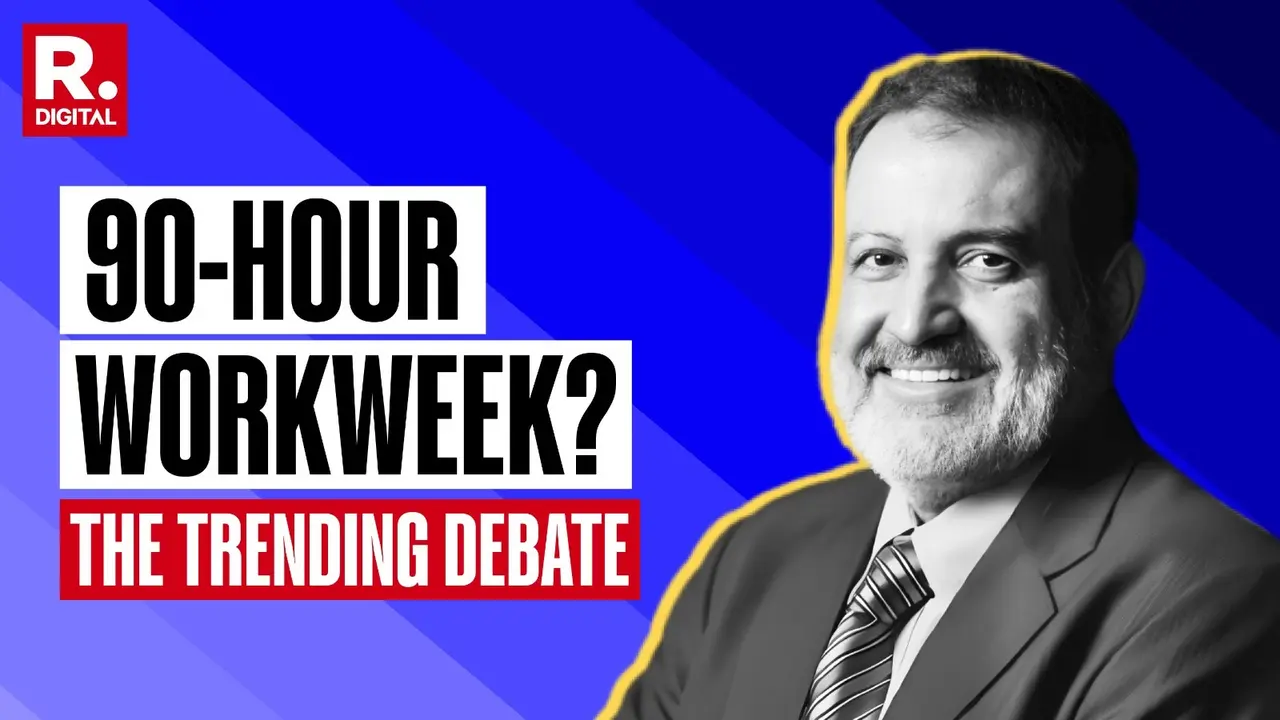Updated 10 January 2025 at 17:05 IST
Exclusive/ 'Personal Choice': Mohan Das Pai Backs Freedom to Choose Amid 90-Hour Workweek Controversy
In an exclusive conversation with Republic Media Network ,Mohan Das Pai weighed in, emphasizing the importance of individual choice in determining work hours.
- India News
- 4 min read

In an exclusive conversation with Republic Media Network, Aarin Capital Chairman and Padma Shri Awardee Mohan Das Pai emphasized the importance of individual choice in determining work hours amidst the ongoing debate over the 90-hour workweek. The controversy arose after SN Subrahmanyan, Chairman of Larsen & Toubro, faced criticism for endorsing a 90-hour workweek and working on Sundays. His remarks sparked widespread debate, drawing criticism from prominent figures such as Bollywood actress Deepika Padukone , badminton player Jwala Gutta, and entrepreneur Harsh Goenka, all of whom highlighted the significance of maintaining a healthy work-life balance.
“Work Hours Are a Personal Choice”
Mohan Das Pai, who had previously supported Narayana Murthy ’s advocacy for a 70-hour workweek, remained firm on his stance. “No company can impose work hours. An individual has to decide their work hours,” he said.
When asked about the competitive pressures in India and whether prioritizing work-life balance might negatively impact employees in such an environment, Pai responded: “Competition is a fact of life. If I work very hard, perform well, and deliver greater value, I will get promoted. If someone prefers not to do more than what’s expected, they can do their work and leave. But rewards will only go to high performers—that’s reality, and we have to accept it.”
Pai elaborated further, saying, “You make the choice, but not everyone can follow that. Similarly, while we cannot force someone to work 90 hours, we also cannot force them to maintain work-life balance. We live in a society that values the freedom to choose.”
Advertisement
Defending Subrahmanyan
Pai also defended Subrahmanyan, stating, “If Subrahmanyan says he wants to work 90 hours, that’s fine. He is a great guy, earning a lot of money, and leading a successful life. Why are people commenting on that? This debate is becoming very silly.”
Addressing concerns about whether longer work hours guarantee productivity, Pai rejected the idea of passing judgment. “Why are people making value judgments? Does that mean people who stay longer are unproductive? Let’s not pass judgment on others,” he said.
Advertisement
Elon Musk as an Example
Taking the example of Tesla CEO Elon Musk, Pai remarked, “Look at Elon Musk, the richest man in the world. He works 24/7. If you don’t want to be like Elon Musk, that’s fine. But we should not criticize people who work 70 or 90 hours.” He added, “Plenty of people work 48 hours a week and perform well. That’s perfectly fine too.”
India vs. Japan
When asked about the long-term impact of a 90-hour workweek in India, Pai argued that only a small fraction of the population works such extended hours. “Maybe 0.5% of the population is working those hours. Nobody in India will willingly work 90 hours unless they choose to,” he said.
Responding to the comparison between India and Japan, which is considering reducing its workweek to four days to improve work-life balance, Pai remarked, “Japan is a very different culture, a highly disciplined society where people respect their seniors. After the Second World War, their generations worked extremely hard to rebuild the country. Now, they have become wealthier and can afford to reduce their work hours. India, on the other hand, is a populous and developing country. If a leader suggests a 70- or 90-hour workweek, it’s up to individuals to accept or reject it.”
Addressing Health Concerns
Concerns about health risks, such as heart disease and strokes, were also discussed, with Pai emphasizing personal responsibility. “People have to take care of themselves. Let’s not generalize based on one example, like the Epigamia CEO. It’s an unfortunate incident, but no one knows the exact cause. People won’t die because of hard work. Farmers work hard every day. If someone wants to be successful, they have to work hard and be productive,” he said.
Pai added, “I worked seven days a week, but nobody forced me. Similarly, no one should force others to work 70 or 90 hours.”
Former L&T Employee Joins
A former L&T employee, who worked at the company in the early 1990s, also joined the conversation. While acknowledging Subrahmanyan’s intention to boost productivity, she criticized the practicality of his suggestion. “The chairman’s intention might be to increase productivity, but it is highly impractical, especially when the headquarters is in Mumbai. This suggestion is not logical,” she said.
Subrahmanyan’s comments come at a time when Millennials and Gen Z are increasingly advocating for work-life balance.
Get Current Updates on India News, Entertainment News, Cricket News along with Latest News and Web Stories from India and around the world.
Published By : Srujani Mohinta
Published On: 10 January 2025 at 15:11 IST
